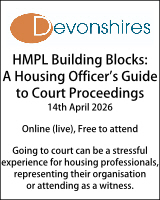
Commonhold reform – the beginning of the end?
Tanya Edmonds of Ashfords answers a number of questions raised by the government's white paper on a reformed commonhold model.
- Details
Earlier this year, the government announced what it termed the ‘beginning of the end’ for the leasehold system in England and Wales. Releasing a new white paper proposing the adoption of an updated and reformed commonhold model for residential flats, the government has also indicated its intention to eventually ban the traditional leasehold model.
Although it may be some time until the ideas set out in the white paper become a legislative reality, if implemented, the reforms will result in a seismic shift in the traditional flat ownership model which currently dominates the marketplace and would create a new tenure system governing housing stock.
There are wide-ranging implications for the setting up and management of estates, as well as the potential conversion of existing estates, which will require consideration prior to the sale of individual units and throughout the lifecycle of housing stock.
In this article, we answer five key questions arising from the government’s white paper.
What is commonhold?
Commonhold is a form of freehold ownership usually intended for individual units in an apartment building which has existed as an alternative to the traditional leasehold model since 2002. Commonhold owners purchase individual units in a building, with the structural and external parts and common areas managed by a ‘commonhold association’ – a company which the unit holders jointly control. There are no individual leases. Instead, the building is managed in accordance with a Commonhold Community Statement which applies equally to all unitholders.
The government’s view is that this system has significant advantages over both the traditional long leasehold model, in which the freehold is held by a separate managing landlord, and the alternative ‘share of a freehold’ model in which leaseholders own the freehold through a limited company and lease their individual units back to themselves.
The key distinction is the Commonhold Community Statement. The intention behind it is to provide a greater degree of transparency and flexibility, with the building managed on the basis of a standard document which can be easily amended with local rules to suit the circumstances and preferences of the unitholders. The government believes this system is more democratic, allowing individuals’ involvement in the management of their home through membership of the commonhold association.
Commonhold-like tenures are widespread internationally, including in the US, France, Germany, and Australia.
What reforms have the government proposed?
To date, the commonhold model has not been widely adopted in the UK. The government acknowledges there are significant weaknesses in the original 2002 legislation. However, they also cite a lack of incentive for the industry to adopt it. In view of this, the white paper proposes a broad tranche of reforms. These include:
- Allowing commonhold properties to be subdivided with separate sections and separate heads of cost, so only those with access to certain services can make decisions about them and are liable for their provision. This is intended to make commonhold more suitable for more complex developments, and avoid disputes arising from unitholders being liable for services they do not see the benefit of.
- Raising the threshold for changing local rules to 75% of unit owners. This is intended to reduce friction between neighbours when a significant minority opposes adding or removing a ‘local rule’.
- Mandating reserve funds. This is intended to mitigate the financial impact of large surprise costs such as flooding or unexpected repairs – something which has been a major topic in recent years following concerns around cladding and fire safety.
- Stronger measures for enforcement of unpaid debts, including the power for a commonhold association to apply for the sale of a unit. This is intended to prevent other unit owners ultimately having to shoulder the burden of their neighbours’ service charge debt.
- An exception to the general rule against Commonhold unit-holders granting residential leases longer than seven years for the grant of shared ownership leases.
The full tranche of proposed reforms can be found in the white paper here.
Will existing leaseholds be converted to commonhold?
At present, existing leases need to be bought out to convert a property to commonhold - a step which requires unanimous consent of all leaseholders in any given block. The government is concerned about the extremely high bar to achieve this. In line with the Law Commission’s recommendations, the government wants the threshold for commonhold conversion to sit at 50%.
This goal must of course contend with the problem of non-consenting leaseholders, who would be deprived of their existing leases if their properties were to be converted without their say so. The white paper explores two options proposed by the Law Commission to deal with this. One option sees mandatory leasebacks to those who do not want to participate in the commonhold conversion, and a second option would provide compensation for conversion with an upfront equity loan funded by the government.
Will leasehold still be an option for residential flats?
The government seems committed to banning the sale of new flats on a leasehold basis, and the stated aim of the white paper is to ensure that commonhold becomes the standard tenure for residential flats in the UK going forward subject to exceptions (i.e. shared ownership leases).
The intention is that shared owners will continue to be leaseholders under a commonhold system – but will also have the ability to take part in decisions on the management and cost of running the building in common with other unitholders who own their properties outright. The voting rights of such owners will typically be exclusive to the leaseholder rather than the social housing landlord, but since the landlord will still have a financial interest, the landlord will have a say on major financial decisions that the commonhold association may make, such as the sale of the entire commonhold block.
What do you need to know?
At the moment, it’s a matter of watch this space. By the second half of 2025, the government aims to publish a draft bill outlining their proposed reforms to the existing commonhold system. At the same time, they state that they will be reaching out to interested parties to help them to prepare for commonhold eventually becoming the standard tenure for new supply of residential flats.
A consultation on banning the sale of new leasehold flats will also follow later this year. The government states it will consider the case for any further limited exemptions, in addition to that for shared ownership and lease-based home purchase plans.
Ashfords has a wealth of experience in the housing sector, and is therefore well-equipped to advise on these issues.
Please contact Tanya Edmonds in the residential development and affordable housing team via her
For more information click here to visit Ashfords' Public Sector and Government page.
22-10-2025 4:00 pm
05-11-2025 4:00 pm

























